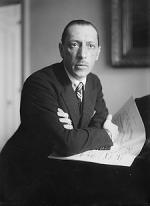Disable ads!
Igor Stravinsky
Igor Stravinsky found recordings a practical and useful tool in preserving his thoughts on the interpretation of his music. As a conductor of his own music, he recorded primarily for Columbia Records, beginning in 1928 with a performance of the original suite from The Firebird and concluding in 1967 with the 1945 suite from the same ballet. In the late 1940s he made several recordings for RCA Victor at the Republic Studios in Los Angeles. Although most of his recordings were made with studio musicians, he also worked with the Chicago Symphony Orchestra, the Cleveland Orchestra, the CBC Symphony Orchestra, the New York Philharmonic Orchestra, the Royal Philharmonic Orchestra and the Bavarian Broadcasting Symphony Orchestra. During his lifetime, Stravinsky appeared on several telecasts, including the 1962 world premiere of The Flood on CBS Television. Although he made an appearance, the actual performance was conducted by Robert Craft. Numerous films and videos of the composer have been preserved. Stravinsky published a number of books throughout his career, almost always with the aid of a (sometimes uncredited) collaborator. In his 1936 autobiography, Chronicle of My Life, which was written with the help of Walter Nouvel, Stravinsky included his well-known statement that "music is, by its very nature, essentially powerless to express anything at all". With Alexis Roland-Manuel and Pierre Souvtchinsky, he wrote his 1939–40 Harvard University Charles Eliot Norton Lectures, which were delivered in French and first collected under the title Poétique musicale in 1942 and then translated in 1947 as Poetics of Music. In 1959, several interviews between the composer and Robert Craft were published as Conversations with Igor Stravinsky, which was followed by a further five volumes over the following decade.
 Read more on wikipedia.org Read more on wikipedia.org
 All quotes by Igor Stravinsky All quotes by Igor Stravinsky
 Edit Edit
|

|
|
|
|
|
Background photo by Giuliana
|